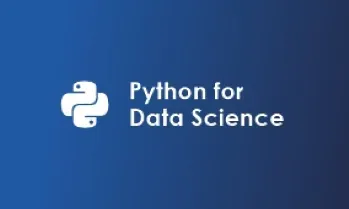
Python for Data Science
Course Overview of Affordable Python for Data Science Coaching in Bangalore with Job Assistance
The Python for Data Science course is designed to equip participants with the skills and knowledge needed to use Python effectively for data analysis and data science tasks. Python, a versatile and widely-used programming language, offers a rich ecosystem of libraries and tools for data manipulation, visualization, and machine learning. This Affordable Python for Data Science Coaching in Bangalore with Job Assistance provides a comprehensive introduction to using Python for various data science applications, from data cleaning and exploration to advanced statistical analysis and machine learning.
1. Develop skills to analyze and interpret complex data sets using Python.
2. Understand the key libraries and tools used in Python for data science.
3. Learn best practices and techniques for data manipulation, visualization, and machine learning.Learn data science skills with real experts, either in live classes with videos or without videos, whichever suits you best.
Description
This course begins with an introduction to Python and its role in data science, covering essential libraries such as NumPy, Pandas, Matplotlib, and Scikit-Learn. Participants will learn how to perform data cleaning, exploratory data analysis, and visualization using Python. The course also covers advanced topics such as statistical analysis, hypothesis testing, and machine learning algorithms. Practical examples, hands-on projects, and real-world data scenarios will be used to reinforce theoretical concepts.1. Gain practical experience with hands-on data analysis exercises.
2. Build real-world projects that reflect industry practices.
3. Explore Python's integration with other data science tools and libraries.Course Objectives
The primary objectives of the Python for Data Science course are as follows:1. Introduction to Python: Provide an overview of Python and its relevance in data science, including basic syntax and data structures.
2. Data Manipulation with Pandas: Explore Pandas for data manipulation, including data frames, series, and operations for data cleaning and transformation.
3. Numerical Computation with NumPy: Cover NumPy for numerical operations, including arrays, mathematical functions, and linear algebra.
4. Data Visualization: Introduce Matplotlib and Seaborn for creating a wide range of visualizations to represent data insights.
5. Statistical Analysis: Understand statistical methods and techniques for data analysis, including descriptive statistics, probability distributions, and hypothesis testing.
6. Exploratory Data Analysis (EDA): Perform EDA to uncover patterns, trends, and relationships in data using Python tools and techniques.
7. Machine Learning Fundamentals: Introduce machine learning concepts and algorithms using Scikit-Learn, including supervised and unsupervised learning.
8. Model Evaluation and Selection: Learn techniques for evaluating and selecting machine learning models, including cross-validation and performance metrics.
9. Data Science Workflow: Understand the end-to-end data science workflow, from data acquisition and preprocessing to model deployment.
10. Practical Projects: Build real-world projects that apply Python to solve data science problems and generate actionable insights.Prerequisites
1. Basic understanding of programming concepts.
2. Familiarity with Python programming language.
3. Knowledge of basic statistics and probability.
4. Understanding of data structures and algorithms.
5. Experience with using and navigating data science libraries (optional but beneficial).
6. Prior exposure to data analysis or data science concepts (optional but beneficial).Who Can Learn This Course
This course is suitable for a diverse range of individuals, including:1. Data Analysts: Professionals looking to enhance their data analysis skills using Python.
2. Data Scientists: Individuals aiming to deepen their knowledge of Python for advanced data science tasks.
3. Analysts and Researchers: Those interested in applying Python to analyze and interpret complex data sets.
4. Business Analysts: Professionals seeking to leverage data science techniques for data-driven decision-making.
5. Students and Graduates: Individuals pursuing degrees in data science, statistics, computer science, or related fields with an interest in Python.
6. Data Engineers: Professionals involved in data processing and pipeline development using Python.
7. Machine Learning Enthusiasts: Individuals interested in learning Python for machine learning applications and techniques.
8. Anyone Interested in Data Science: Enthusiasts curious about leveraging Python for data analysis and insights.The Python for Data Science course is designed to cater to both beginners and individuals with some experience in data science, providing a solid foundation in Python tools and techniques for analyzing and interpreting data.
Course Curriclum
Training Features
Comprehensive Curriculum
Master web development with a full-stack curriculum covering front-end, back-end, databases, and more.
Hands-On Projects
Apply skills to real-world projects for practical experience and enhanced learning.
Expert Instructors
Learn from industry experts for insights and guidance in full-stack development.
Job Placement Assistance
Access job placement assistance for career support and employer connections.
Certification upon Completion
Receive a recognized certification validating your full-stack development skills.
24/7 Support
Access round-the-clock support for immediate assistance, ensuring a seamless learning journey.
Upcoming Batches
Placed Students
Enroll now and join our alumni.
Explore More Courses
Enroll for : Python for Data Science
Start Date: 2024-10-01
Mentor: Working Professional
Duration: 3 Months
